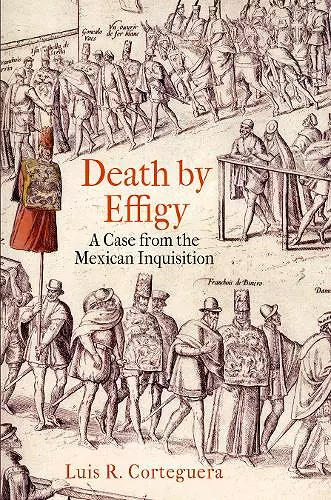Death by Effigy
A Case from the Mexican Inquisition
Format:Paperback
Publisher:University of Pennsylvania Press
Published:17th Oct '14
Currently unavailable, and unfortunately no date known when it will be back

On July 21, 1578, a small Mexican town awoke to the news of a scandal. Nailed to the door of its church was a double-faced effigy denouncing a neighbor as a Jew who should burn at the stake. Nine trials over the course of four years revealed a story of dishonor, revenge, and the Inquisition's relentless determination to defend its symbols.
On July 21, 1578, the Mexican town of Tecamachalco awoke to news of a scandal. A doll-like effigy hung from the door of the town's church. Its two-faced head had black chicken feathers instead of hair. Each mouth had a tongue sewn onto it, one with a forked end, the other with a gag tied around it. Signs and symbols adorned the effigy, including a sambenito, the garment that the Inquisition imposed on heretics. Below the effigy lay a pile of firewood. Taken together, the effigy, signs, and symbols conveyed a deadly message: the victim of the scandal was a Jew who should burn at the stake. Over the course of four years, inquisitors conducted nine trials and interrogated dozens of witnesses, whose testimonials revealed a vivid portrait of friendship, love, hatred, and the power of rumor in a Mexican colonial town.
A story of dishonor and revenge, Death by Effigy also reveals the power of the Inquisition's symbols, their susceptibility to theft and misuse, and the terrible consequences of doing so in the New World. Recently established and anxious to assert its authority, the Mexican Inquisition relentlessly pursued the perpetrators. Lying, forgery, defamation, rape, theft, and physical aggression did not concern the Inquisition as much as the misuse of the Holy Office's name, whose political mission required defending its symbols. Drawing on inquisitorial papers from the Mexican Inquisition's archive, Luis R. Corteguera weaves a rich narrative that leads readers into a world vastly different from our own, one in which symbols were as powerful as the sword.
"An important contribution to the literature on the early modern Spanish world and, specifically, to the large and seemingly ever-growing body of scholarship related to the inquisition. The case illustrates the power of inquisitorial symbols and the juridical nature of inquisitorial investigations. It approximates a transcription of an Inquisition case, although judiciously condensed into an absorbing narrative." * American Historical Review *
"A very engaging piece of microhistory based on a case heard by the Inquisition in late sixteenth-century Mexico. . . . Corteguera does a very good job of unraveling this rather convoluted case and of discussing the motives of all those involved." * Sixteenth Century Journal *
"Corteguera's delightful book, elegantly written and meticulously considered, . . . is a marvelous reconstruction of the social universe of a small town in New Spain, but the book goes a good deal further. It offers excellent overviews of the way the Inquisition operated, dispelling many myths along the way." * The Medieval Review *
"Corteguera unearths a memorable and multifaceted story from deep inside the still little-known society of early colonial Mexico. Sophisticated in its treatment of a great array of topics, from early modern religion, morality, and sexuality, through an interweaving of interethnic rivalry, Inquisitional symbology and procedure, to the pervasiveness of a culture of rumor and reputation, Death by Effigy is a significant contribution." * Kenneth Mills, University of Toronto *
"Beautifully written and well organized, not only does Death by Effigy bring the period alive, it does so in an almost cinematographic manner. A wonderful teaching tool." * Tamar Herzog, Stanford University *
ISBN: 9780812223163
Dimensions: unknown
Weight: unknown
240 pages